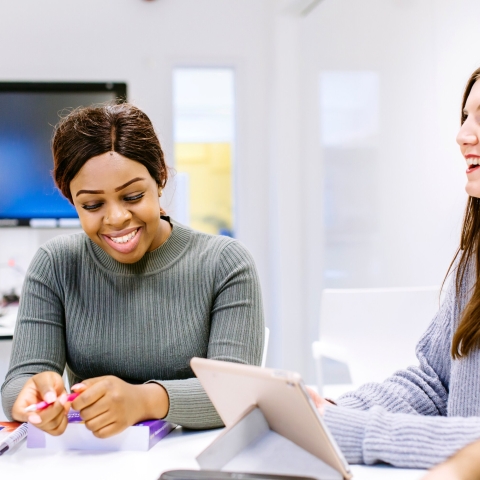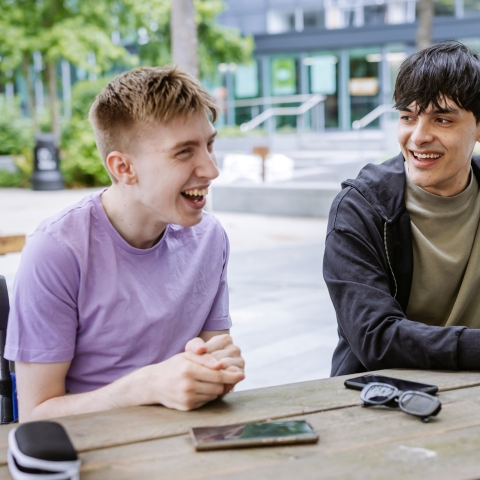
Your personal academic tutor and student success advisor are here to support you throughout your studies and help you get the most out of your time studying.
Your personal academic tutor is an academic member of staff in your department who is committed to helping you reach your potential at university. They'll support you by providing academic advice throughout your degree.
Your personal academic tutor can give you academic advice for certain aspects of your course, support you personally, write you a reference and discuss your career options with you. They're well-connected and have links to other departments at the University and links to professionals and companies.
Your student success advisor should be the first person you speak to at University if you have any difficulties, especially if they impact your studies. You can speak to your success advisor about personal issues, financial problems, health-related worries, or another type of problem. They'll support you or direct you to other University services if you need them. We have services including counsellors, careers advisers, disability advisers, and immigration, housing, money and welfare specialists.
How your personal academic tutor can help you
Your personal academic tutor can:
- help you adjust to being a student
- provide guidance, support and encouragement
- share their expertise
- discuss your academic progress with you
- help develop your independent learning skills
-
answer any questions you have about the University or your studies
-
write you an academic reference
How your success advisor can help you
Your success advisor can:
- help you adjust to being a student
- provide guidance, support and encouragement
- support you if difficulties arise and direct you to specialist services or support if needed
- be a single point of contact between you and the University
- help with attendance and/or engagement queries or issues
- provide evidence in support of you Extenuating Circumstances
What your personal academic tutor and success advisor can help with
The issues below may impact your time at University. Click on the plus symbol beside each issue to see how your tutor can support you.
We are aware that this H5P component is not fully accessible. If you would like a copy of this item, please email websupport@port.ac.uk. Please also refer to our Accessibility Statement
Meeting your personal academic tutor
You should meet your personal academic tutor in the first week of your studies. If you aren't contacted to meet your tutor in your first week, you should email them to say hello and arrange a meeting. Suggest some times that you're free in your email, or check their office hours and drop in to see them then.
Students say meeting with your tutor regularly is a chance to evaluate your learning and review your academic progress. You might meet your tutor face-to-face or virtually, including a mix of individual and group sessions. You should aim to meet your personal tutor at least once each term, or more frequently if needed.
Meeting your student success advisor
Your student success advisor will introduce themselves to you (in person or via email, or both) usually during the first week of your studies. It is not necessary to individually meet your student success advisor, but they will be available to meet face-to-face or virtually if you have any questions or need pastoral support.
Your success advisor will be monitoring your attendance and engagement, and they will contact you to check up on you if your attendance falls below the required threshold.
What will we talk about?
Discussions with your personal academic tutor will focus on how you're adjusting to university life, your academic progress and goals and what opportunities you're taking part in. You could talk about your results and general feedback as well. This could help you identify themes appearing across your assignments to help you explore your strengths and weaknesses in your studies.
Discussions with your student success advisor will focus on any difficulties you may experience. You can contact your success advisor anytime you need help with any non-academic matters.
The cards below highlight some of the subjects you can discuss with your academic tutor and success advisor.
We are aware that this H5P component is not fully accessible. If you would like a copy of this item, please email websupport@port.ac.uk. Please also refer to our Accessibility Statement
Do I still need to meet with my personal academic tutor and success advisor if everything is okay?
You should meet with your personal academic tutor even if you don't have problems. Tutorials are a chance to reflect on your general progress and your successes, and identify other opportunities you would enjoy. Meeting your tutor regularly also helps to build up your relationship with them, which will help if you need support later in your studies or want to ask them for a reference after you graduate.
You don’t need to meet your success advisor regularly, but they will be available anytime you need pastoral help and support.
Can my personal academic tutor help if I'm finding academic work difficult?
Your personal academic tutor will help you with academic issues. They can help you improve your study skills and direct you to further help if you need it. Your personal academic tutor will encourage you to develop academic skills and improve your work rather than helping you complete a specific assignment, and can also discuss your feedback from past assignments with you.
I'm disabled. Does my personal academic tutor and/or student success advisor have to know?
It's your choice whether to tell your personal tutor about a disability. Our Disability Advice service will support you if your disability is impacting your studies or if you require adjustments to support your learning. We recommend you consider sharing issues or adjustments with your personal academic tutor too so they can support you from within your school. Any information you share with your academic tutor and success advisor is treated sensitively and won't be shared with others without seeking your consent first.
Do I have to tell my success advisor if I'm having personal difficulties?
You can decide whether to discuss any personal issues with your success advisor. If your personal difficulties are likely to affect your studies, we encourage you to discuss them with your success advisor so they can support you. Your success advisor can support you directly and discuss what additional support services are available to you, such as Student Wellbeing.
Visa questions?
If you are experiencing issues concerning your visa, then you need to contact the International Student Advice team. Your academic tutor and success advisor will not be able to advise you about visa issues but they will want to know if this is affecting your academic work. Examples include interrupting your studies, transferring to a new course and withdrawing from the University.
What if my personal academic tutor or success advisor isn’t available?
If you've tried to meet your personal academic tutor and they aren't available, contact your success advisor. If your student success advisor is not available, another advisor can help you.
Further support
Academic skills support
Looking to improve your academic skills and enhance your uni work? Our faculty learning support tutors can help you develop key study skills, and you can also access our online learning resources too.

Disability Advice
Here you'll find expert support for students with disabilities or additional learning needs. Get confidential advice and support on disability-related issues.

Enable University alerts
Turn on notifications for critical updates like closures, safety alerts, and urgent service disruptions.






